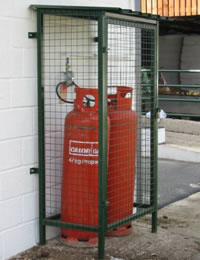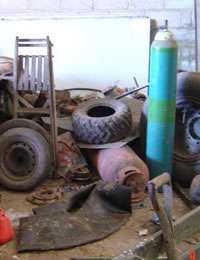
Cylinders are a common risk at agricultural incidents, and can cause significant issues to firefighters:
- It can be very difficult to identify the location of cylinders in smoke.
- When heated, cylinders can explode, fragment or behave like a rocket.
- Walls are no protection from an exploding cylinder.
- Firefighters have been killed by exploding cylinders, so they have to minimise the risk to themselves if cylinders are involved at an incident. This means they might not be able to protect your property, due to the extreme danger to life.
- Most farms do not store cylinders appropriately and have unused cylinders stored unnecessarily.
Where there are unsafe cylinders involved in or adjacent to a fire, a safety cordon will be put in place whilst the cylinder is cooled and monitored. For acetylene and LPG cylinders, the cordon is 200m, so this could have impacts on the business involved and surrounding infrastructure, as well as potentially limiting the firefighting that can take place.
An owner may be liable for compensating anyone affected by this inconvenience – just think about the implications if you live near a mainline railway or major road, hotel or industrial estate!
How to manage cylinders
- Limit the numbers of cylinders you keep.
- Any unnecessary acetylene cylinders should be removed immediately and taken back to the supplier – some will arrange collection. Acetylene cylinders will result in major disruption and huge financial implications if involved in a fire.
- Cylinders should be stored on their own, ideally outside in a cage or similar locked store, with a sign indicating their presence.
- Review your work and decide whether you even need to use acetylene. There are alternatives, such as oxy-propane or petro-gen, that are much safer and will not cause you as many problems if involved in fire.
- Erect signs to alert firefighters to the presence of cylinders if they are in buildings.
At a fire, give firefighters as much information as possible about what cylinders you have and where they are located.
 Good storage |
 Bad storage |